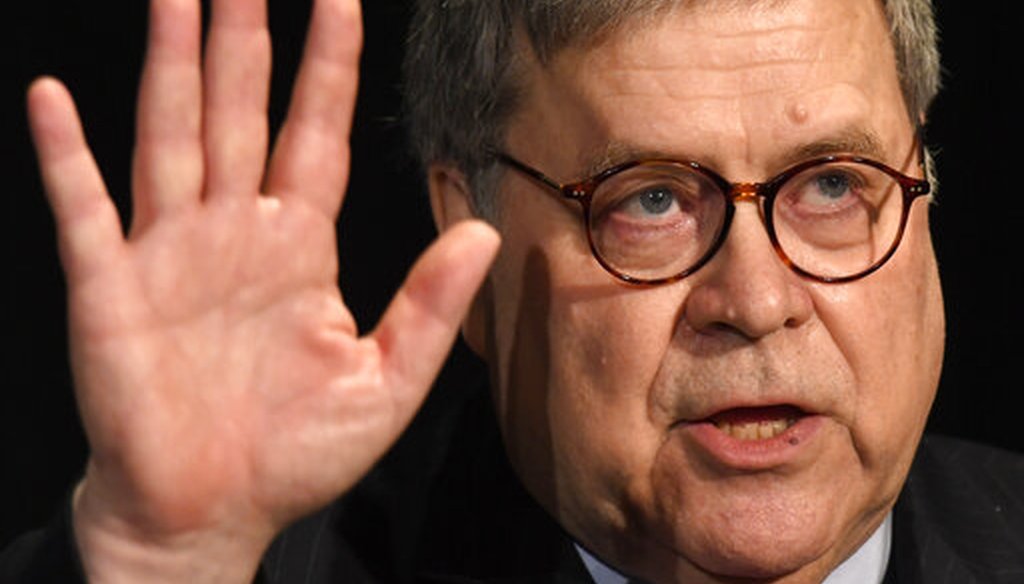Stand up for the facts!
Our only agenda is to publish the truth so you can be an informed participant in democracy.
We need your help.
I would like to contribute

Attorney General William Barr speaks in Washington on Feb. 10, 2020. (AP)
If Your Time is short
-
There are few laws that constrain presidential involvement in Justice Department decisions.
-
The one major law that could come into play, involving obstruction of justice, would require proving that the intervention was undertaken for corrupt purposes — a high threshold.
-
To the extent that there has been separation between recent presidents and the Justice Department, it has been based on norms and traditions.
After President Donald Trump complained about the Justice Department’s proposed seven-to-nine year sentence for longtime Trump ally Roger Stone, the department reduced the sentence it was proposing for Stone.
This move alarmed Trump’s critics, who perceived it as the president meddling in a criminal case — a breach of the usual arm’s-length relationship on criminal cases between the White House and the Justice Department.
With so much attention now focused on the Justice Department and its independence from politics, a PolitiFact reader asked us to take a closer look at how much influence the president is permitted to have on prosecutorial decisions at the Justice Department.
It’s actually a bit more nuanced than one would think from how the debate has played out so far, legal experts say. Trump does have the right to intervene — though within limits.
Do you have a question for us? Email us at [email protected], and we’ll try to answer it. Put "Ask PolitiFact" in the subject line.
Sign up for PolitiFact texts
The current controversy emerged after the initial Justice Department recommendation for Stone’s sentencing was rescinded. Four prosecutors protested by withdrawing from the case. Meanwhile, hundreds of veterans of the Justice Department spoke out in an open letter, calling for Attorney General William Barr to resign and writing that they "strongly" condemned Trump’s and Barr’s "interference in the fair administration of justice."
Barr, meanwhile, sat for an ABC News interview on Feb. 13 and urged Trump to stop tweeting about Justice Department cases, saying it makes "it impossible for me to do my job and to assure the courts and the prosecutors in the department that we’re doing our work with integrity."
Trump responded in a tweet that he has "the legal right" to intervene in cases handled by the Justice Department.
Does he? Yes, within some limits.
We asked Peter Zeidenberg, a partner at the law firm Arent Fox LLP who previously spent 17 years as a federal prosecutor, including in the Justice Department’s public integrity section and in the U.S. Attorney’s Office for the District of Columbia.
He said the president "has the legal right to ask the attorney general to intervene in a federal criminal case," though such actions are generally frowned upon.
"There is strong precedent and custom that the Justice Department is meant to be apolitical and that it is unquestionably improper for the department to permit political considerations to affect its investigative, charging, or sentencing decisions," Zeidenberg said.
Whether presidential involvement in a Justice Department case is allowed or prohibited depends heavily on the nature of the case.
"The president has a constitutional duty to take care that the laws be faithfully executed," said Barbara L. McQuade, a University of Michigan law professor. "It would be proper, for example, for a president to ask the attorney general to decline to file charges if it would interfere with a drone strike being planned by the Defense Department, or a treaty negotiation being conducted by the State Department."
By contrast, actions that would benefit the president personally, or aid presidential friends and allies, would be problematic.
"It would be improper for the president to ask the attorney general to investigate a political rival, or to be lenient on a friend or family member," McQuade said.
The clearest barrier to presidential intervention in a case involves statutes against obstruction of justice.
Three elements are generally required for a conviction on obstruction of justice: the existence of a pending federal judicial proceeding; the defendant’s knowledge of the proceeding; and the defendant’s corrupt intent to interfere with, or attempt to interfere with, the proceeding.
Presumably, the president in this example would know about a pending federal proceeding. So the question would be whether the presidential action was undertaken with corrupt intent, said Robert Weisberg, director of the Stanford University Criminal Justice Center.
However, even if a president’s corrupt intent seemed clear, longstanding Justice Department guidelines would block the indictment of a sitting president. This would mean that the only immediate remedy is impeachment — a process that has already been tried against Trump. Trump has already been impeached, but the Senate voted against removing him.
The attorney general would not have to obey an order they believed was improper, though if they didn’t, they would risk being fired, said Vanderbilt University law professor Christopher Slobogin.
So if there isn’t much of a legal bar against presidential involvement in Justice Department decisions, why the outcry? It has to do with the erosion in longstanding norms and traditions.
The backlash to President Richard Nixon’s efforts to influence law enforcement actions during the Watergate scandal led presidents of both parties to put more distance between themselves and the Justice Department.
"Nixon was criticized for telling his attorney general to drop an antitrust prosecution of ITT, and his attorney general, Richard Kleindienst, actually pled guilty to lying to Congress about the affair," said James Robenalt, an attorney who teaches a course about Watergate.
To affirm the separation, attorneys general have issued memos that set limits on the communications between the Justice Department and the White House.
For instance, a memo released in 2007 under President George W. Bush prefaced the policy by saying that communications on pending criminal and civil-enforcement matters "must be limited" to situations "where it is important for the performance of the president's duties and where appropriate from a law enforcement perspective." The goal, the memo said, is to ensure that there is "public confidence that the laws of the United States are administered and enforced in an impartial manner."
A 2009 memo released under President Barack Obama used even stronger language to support the idea of distance between the White House and the Justice Department to ensure impartiality.
"The rule of law depends upon the evenhanded administration of justice," the 2009 memo said. "The legal judgments of the Department of Justice must be impartial and insulated from political influence. It is imperative that the department's investigatory and prosecutorial powers be exercised free from partisan consideration. It is a fundamental duty of every employee of the department to ensure that these principles are upheld in all of the department's legal endeavors."
The memo issued by the Trump administration in 2017 upheld the gist of the previous memos, but its prefacing language was more restrained.
"These rules exist to ensure both efficient execution of the administration’s policies and the highest level of integrity with respect to civil or criminal enforcement proceedings handled by DOJ," the 2017 memo said. "In order to ensure that DOJ exercises its investigatory and prosecutorial functions free from the fact or appearance of improper political influence, these rules must be strictly followed."
Ultimately, Zeidenberg said, interventions like Trump’s "infect" the process and weaken public confidence in how the Justice Department comes to its decisions.
"But it is not, strictly speaking, illegal."
Our Sources
Donald Trump, tweet, Feb. 14, 2020
Justice Department memos on White House communication, 2007, 2009, and 2017
"DOJ Alumni Statement on the Events Surrounding the Sentencing of Roger Stone," Feb. 16 , 2020
Associated Press, "Trump's Exaggerations on Roger Stone Sentence," Feb. 17, 2020
New York Times, "After Stone Case, Prosecutors Say They Fear Pressure From Trump," Feb. 12, 2020
New York Times, "How Trump’s Relationship With Barr Got So Complicated," Feb. 14, 2020
New York Times, "Former Justice Dept. Lawyers Press for Barr to Step Down," Feb. 16, 2020
Fox News, "Trump insists he has ‘legal right’ to intervene in DOJ cases, but has chosen not to," Feb. 14, 2020
PolitiFact, "Martha Stewart to Donald Trump: Can there be obstruction of justice with no underlying crime?" March 25, 2019
Email interview with James D. Robenalt, attorney with the firm Thompson Hine LLP and creator of a continuing legal education class on Watergate, Feb. 19, 2020
Email interview with Peter Zeidenberg, partner at the law firm Arent Fox LLP, Feb. 18, 2020
Email interview with Barbara L. McQuade, University of Michigan law professor, Feb. 18, 2020
Email interview with Robert Weisberg, director of the Stanford University Criminal Justice Center, Feb. 18, 2020
Email interview with Christopher Slobogin, Vanderbilt University law professor, Feb. 18, 2020














































